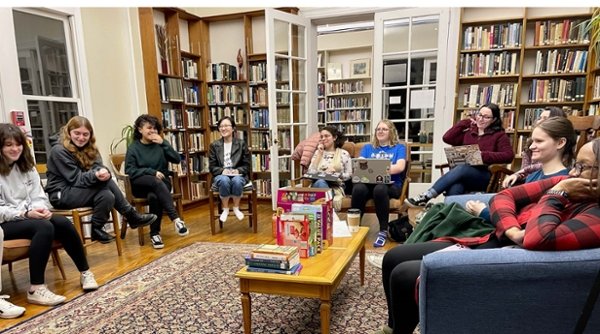Undergraduate students explore creative output at Pennsylvania writers retreat
Undergraduate students explore creative output at Pennsylvania writers retreat

“Easy reading is damn hard writing.”
So said Nathaniel Hawthorne, the 19th Century novelist best known for penning “The Scarlett Letter,” the story of a young woman in the Massachusetts Bay Colony who has a child out of wedlock and is severely punished for it.
To make writing a bit less hard, or at least to get their creative output started, writers for generations have attended retreats – getaways to often secluded and scenic locales where they unplug from workaday life and seek inspiration to create.
From Jan. 13-15, some students in Rowan University’s popular Writing Arts program attended Pendle Hill, a Quaker retreat in Wallingford, Pa., where they studied the power of nature to inspire creativity and learned the value of time spent with other writers.
Three Writing Arts faculty and 13 students took part in the retreat, a program first held in 2020.
Assistant Professor Megan Atwood said the weekend included a range of activities and games to spur creative thinking as well as time for dining, rest, and, of course, writing.
“The three of us led workshops and mine was on world-building,” said Atwood, a prolific writer who largely writes young adult sci-fi and fantasy books. “With genre fiction like fantasy and sci fi, we think of creating a world, but all writing does that. (We focused on) how to create it, how we walk in our own worlds and how we can bring it into our writing.”
Cherita Harrell, a Writing Arts lecturer, said retreats are about finding inspiration as much as, if not more than, the number of pages written while attending them.
“The main thing is building community and talking about writing,” Harrell said. “We created a space where the writing can happen. It was a process of getting started. By the end of the weekend, most got something down and that’s the biggest thing.”
Harrell led a workshop on self-reflection and the ways in which writers can use personal experience in the creative process while Assistant Professor Heather Lanier led the group in a discussion of “borrowed forms.” A purely creative exercise, that workshop explored different ways of thinking about writing including an examination of Lorrie Moore’s essay, “How to be a writer.”
“It was written as a how-to guide on how to be a writer, which was funny because there really is no how-to guide on how to be a writer,” Lanier said.
Rowan’s Department of Writing Arts in the Ric Edelman College of Communication & Creative Arts offers Bachelor of Arts and Master of Arts degrees, the First-Year Writing Program, which is required of all undergraduates, and features a diverse faculty who publish regularly in a wide range of genres. The only department of Writing Arts in the country, its programs cover a wide range of writing, from comedy to environmental writing to spoken word poetry.
Senior Writing Arts major Diana DeSimine, who is president of Rowan’s Writing Arts Club, said Pendle Hill’s setting put her in the mindset to write.
“I worked some ideas out that I already had,” said DeSimine, who loves writing poetry and short fiction. “I got to share my stuff too and it was nice hearing my work out loud.”
Robin Dougherty, who is also a senior Writing Arts major, said the experience of a real writers retreat was exactly as it was intended – a calm break from daily routines that provided time to think and create.
“I’m just so glad I decided to go,” Dougherty said. “I’d never been on a writing retreat before but it definitely inspired me. I felt like, I’m separated from everything else and have just me, my work and nature.”
Lanier, whose 2020 memoir, “Raising A Rare Girl,” was hailed as a literary triumph from The New York Times to Slate magazine, attended Pendle Hill over the summer and said the benefits of getting away, having the time to simply think, write or otherwise create, cannot be overstated.
“I was working on a book manuscript and had that concentrated time to really focus,” she said. “Being away, out of your ordinary circumstances, where there are minimal distractions, where you’re fed good meals, a lot can happen. Now our students have that experience.”